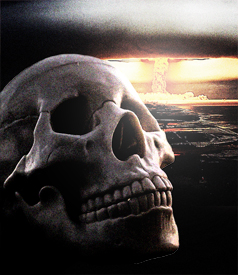For some time now, it has been clear that nuclear weapons threaten the existence not only of humanity, but of all life on Earth.
Thus, Barack Obama’s pledge to work for a nuclear weapons-free world—made during his 2008 presidential campaign and subsequently in public statements—has resonated nicely with supporters of nuclear disarmament and with the general public.
But recent developments have called that commitment into question. The administration’s Nuclear Posture Review does not indicate any dramatic departures in the use of nuclear weapons, while its nuclear weapons budget request for the next fiscal year represents a 14 percent increase over this year’s counterpart. The most alarming sign that the administration might be preparing for a nuclear weapons-filled future is its proposal to spend $180 billion over the next ten years to upgrade the U.S. nuclear weapons production complex.
From the standpoint of nuclear critics, the best interpretation of such measures—and one that might be accurate—is that they are designed to win support among hawkish Republican senators for the New START Treaty, which will reduce U.S. and Russian nuclear arsenals. After all, the political argument goes, if Obama is to secure the sixty-seven Senate votes necessary to ratify the treaty, he needs to pick up some Republican support. Of course, these pro-nuclear measures might reflect a quite different scenario, one in which Obama is abandoning yet another political promise.
In this context, we might ask: would abandoning the promise of nuclear abolition be a bad idea?
There are at least five good reasons why it would be:
- If nuclear weapons are not scrapped, it is inevitable that, sooner or later, they will be used in war. Nations (and before them, competing territories) have engaged in war for thousands of years, and for these wars they have been tempted to draw upon the most powerful weapons in their arsenals. Today, such weapons are nuclear weapons—some 23,000 of them. Although supporters of these weapons maintain that they deter nuclear war, there is no reason to assume that nuclear deterrence works, or at least works in all cases. This is indicated by the U.S. government’s pursuit of national missile defense and its attempts to head off other nations (e.g. Iran) from developing nuclear weapons.
- If nuclear weapons are not scrapped, it is inevitable that additional nations will develop them. When some nations maintain large, devastating nuclear arsenals, it is naïve to expect other nations to tamely sit back and accept their non-nuclear status. Over the decades, this situation of military inequality has spurred on nuclear proliferation and, unless nuclear nations divest themselves of their nuclear weapons, it will continue to do so.
- If nuclear weapons are not scrapped, it is likely that they will be used by terrorists. Terrorists do not have the production facilities for building or testing nuclear weapons, but they have the possibility of obtaining them, though theft or bribery, from national arsenals. While nuclear weapons exist in national arsenals, obtaining and using them against civilian populations will provide a constant temptation to terrorists.
- If nuclear weapons are not scrapped, it is likely that they will be exploded accidentally. Numerous nuclear accidents—from nuclear weapons dropped to mistaken nuclear war alerts—have already occurred, although so far without detonation. In an age of BP oil explosions and other technological disasters, there are limits to how long we can press our luck with nuclear weapons technology.
- If nuclear weapons are not scrapped, they—and the uranium mining, warhead production, and testing they necessitate—will continue to pollute the earth with radioactive waste for thousands of years. Nuclear waste disposal is already a very significant problem in the United States, and, not surprisingly, no state has yet volunteered to serve as the permanent dumping ground for it.
In short, while nuclear weapons exist, we are living on the brink of an unprecedented catastrophe.
Thus, if we are wise, we should draw back from the brink and address the problem posed by nuclear weapons. If the U.S. government and others are serious about building a nuclear weapons-free world, they should begin negotiations on a nuclear abolition treaty. And, if they are not serious about nuclear abolition, the public should raise enough of a ruckus so that they have no alternative to becoming serious.
If we can’t live with the Bomb, we should begin planning to get rid it.
Our most important fundraising appeal of the year
December is the most critical time of year for Truthout, because our nonprofit news is funded almost entirely by individual donations from readers like you. So before you navigate away, we ask that you take just a second to support Truthout with a tax-deductible donation.
This year is a little different. We are up against a far-reaching, wide-scale attack on press freedom coming from the Trump administration. 2025 was a year of frightening censorship, news industry corporate consolidation, and worsening financial conditions for progressive nonprofits across the board.
We can only resist Trump’s agenda by cultivating a strong base of support. The right-wing mediasphere is funded comfortably by billionaire owners and venture capitalist philanthropists. At Truthout, we have you.
We’ve set an ambitious target for our year-end campaign — a goal of $119,000 to keep up our fight against authoritarianism in 2026. Please take a meaningful action in this fight: make a one-time or monthly donation to Truthout before December 31. If you have the means, please dig deep.
